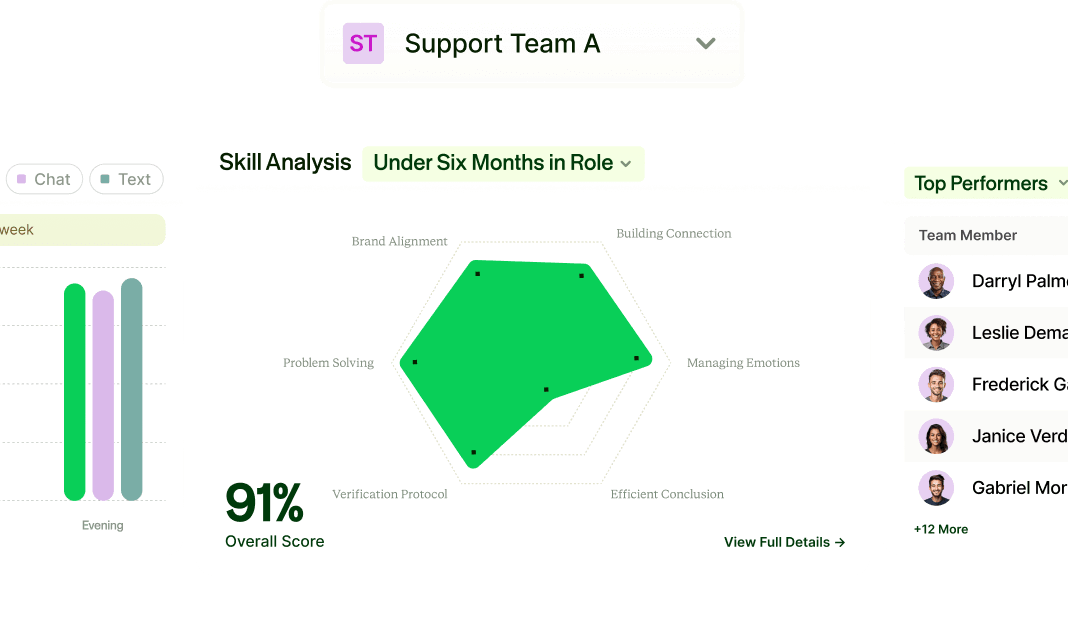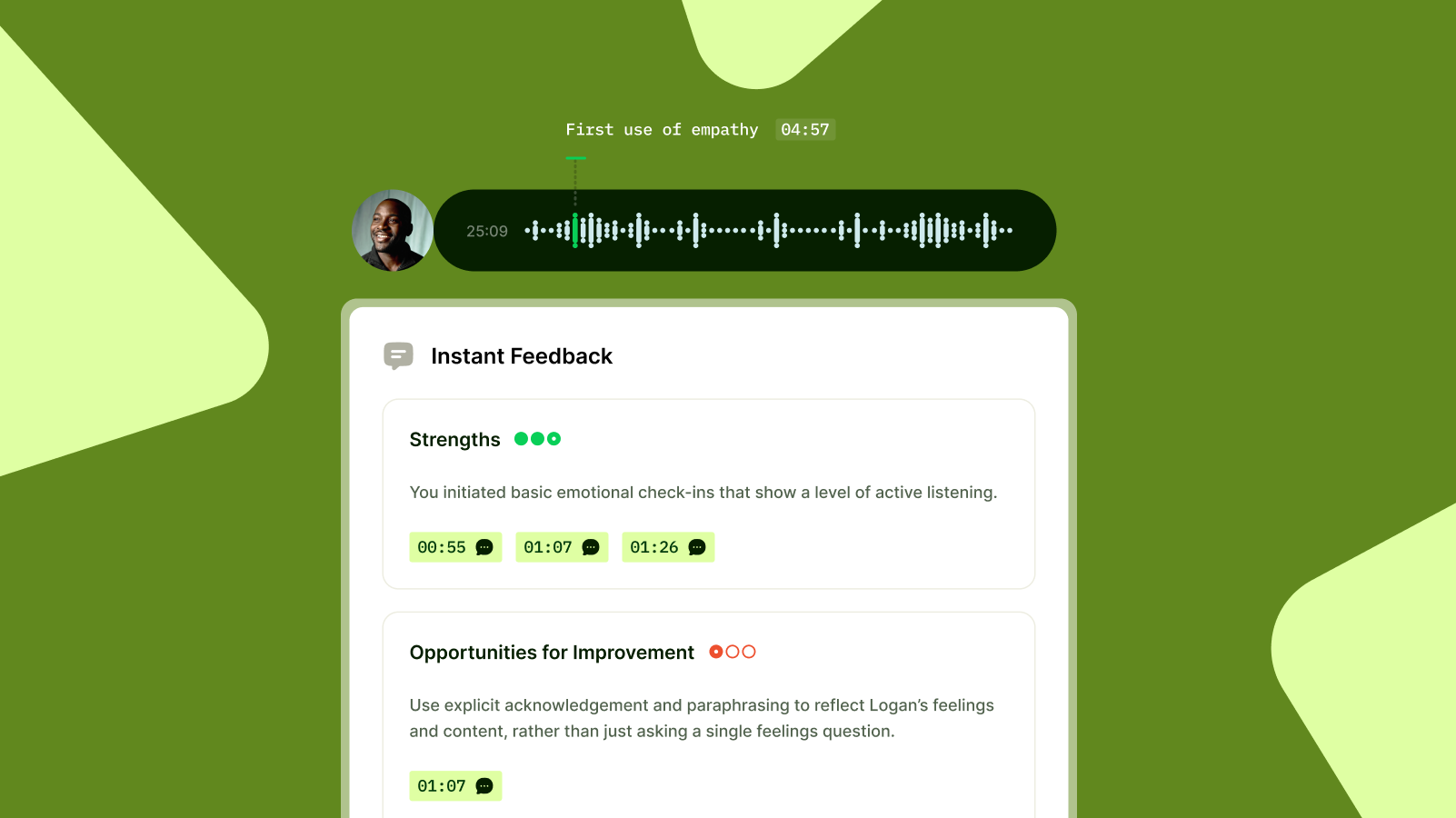If you’re responsible for leading a contact center or overseeing customer experience, you’ve likely seen firsthand how challenging it can be to keep agents prepared for the wide range of conversations they’ll face on a daily basis. From complex technical support issues to emotionally charged customer concerns, frontline employees are expected to handle it all… with empathy, speed, and precision.
Yet, traditional training methods too often fall short. That’s where call center simulations come in.
What is a call center simulation?
A call center simulation is an interactive training experience that mimics a real-life customer interaction. Instead of passively reviewing scripts or overly relying on slide presentations, agents engage in simulated calls. When done manually, this exercise is usually done with a trainer or peer, either in-person or via Zoom. They can be valuable, but can be inconsistent while also being highly manual to schedule and run.
When done with an innovative tool, a call center simulation can involve a participant engaging with a nuanced AI persona, which mimics the type of an interaction that the agent would face in on the lines. It can be more consistent, more efficient, and highly impactful. At its best, these simulations replicate the pacing, pressure, and unpredictability of live conversations better than a manual roleplay.
These simulations are designed to prepare agents for both routine and difficult calls, making them a powerful addition to any training program.
Why do call center simulations matter?
Simulated calls create space for agents to practice without consequence. Just like a flight simulator prepares a pilot for turbulence, call center simulations expose trainees to high-stakes situations in a safe, repeatable environment. This boosts their readiness and resilience before they ever pick up a real phone.
And while traditional simulations have value, AI-driven call center simulations are proving to be the most advantageous by far. They combine scalability, realism, and actionable feedback in a way no manual method can match.
Here’s why more contact center leaders are turning to AI-enhanced simulations as a training cornerstone:
- Accelerated and Personalized Onboarding: AI-driven simulations allow new hires to engage with dozens (or more!) realistic call scenarios tailored to specific roles, industries, and customer challenges. This accelerates the onboarding timeline while delivering highly relevant practice. The result: agents reach full productivity faster and with more confidence.
- Consistent, Scalable Training: Unlike peer-led roleplay, which varies based on trainer skill or time constraints, AI simulations deliver a consistent experience to every trainee. Tools like ReflexAI Prepare allow teams to configure scenarios based on actual customer profiles, product offerings, and common objections. This flexibility ensures relevance without sacrificing efficiency.
- Actionable Performance Insights: AI simulations capture real-time performance data across key skills such as protocol compliance, empathy, de-escalation, and communication. Rather than relying on sporadic call reviews, managers gain reliableinsight into agent readiness. This enables targeted coaching and supports quality assurance at scale.
- Confidence Without Consequences: For many agents, especially new or younger hires, early mistakes can shake confidence. AI personas provide a judgment-free environment where agents can make mistakes, recover, and grow. This controlled setting helps them build emotional resilience and preparedness for tough customer interactions, without the fear of real-world consequences.
As outlined in recent workforce studies, confidence plays a critical role in retention. Employees who feel unprepared are more likely to leave. AI Simulations close that gap by offering practical experience that sticks.
What are call center simulation tests?
Call center simulation tests are structured, scenario-based evaluations that assess an agent’s readiness to handle real customer interactions. These simulations go beyond multiple-choice questions or static knowledge checks. Instead, they immerse agents in dynamic, branching conversations that replicate the types of calls they’ll face on the job.
One of the most powerful applications of simulation testing is in designing curated onboarding journeys. Training leaders can build structured paths where agents progress through a series of AI-driven personas, each representing a different customer type, issue category, or emotional tone. These personas can be tailored to reflect the unique challenges of your industry. Whether that means navigating HIPAA compliance in healthcare, de-escalating returns during a retail peak season, or explaining technical billing issues in utilities.
This progression allows new hires to build muscle memory, emotional fluency, and situational awareness gradually. Rather than throwing agents into live calls with incomplete preparation, simulation tests offer a measured ramp-up that builds both skills and confidence.
For contact centers operating in high-stakes or highly regulated environments, simulation tests also provide an auditable, repeatable way to verify readiness. Leaders can identify specific competencies, such as empathy, clarity, or compliance, and measure performance consistently across the team.
By integrating AI simulation tests into your training programs, you not only accelerate time to proficiency, but also ensure every agent is exposed to the scenarios that matter most to your customers and your brand.
Bridging the gap between training and performance
At the end of the day, contact center success hinges on people. Simulations give your people the tools to succeed. They enable better coaching, faster onboarding, and more consistent service quality, no matter the channel or customer profile.
By integrating AI simulations into your training strategy, you’re not just improving performance metrics. You’re investing in the confidence and capability of your team.
Ready to learn more?
Whether you’re leading a customer service team, running operations, or shaping the agent experience strategy, it’s time to take a closer look at how simulations can elevate your training approach.













